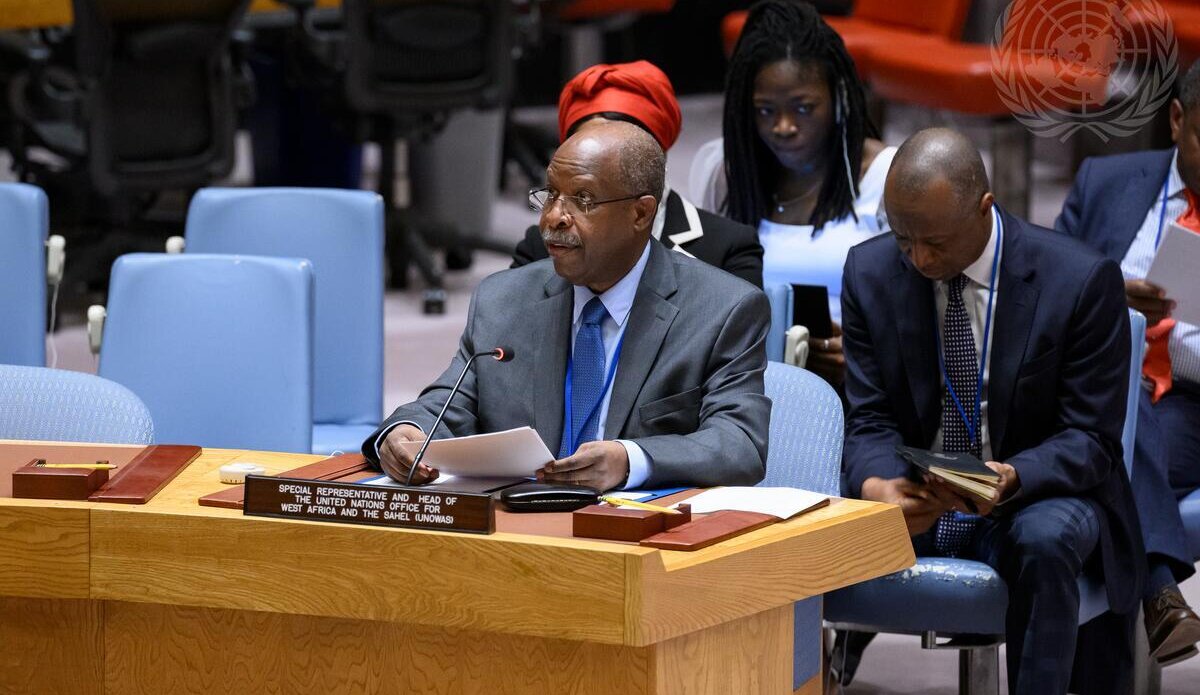At the United Nations Security Council, Special Representative Simão pledges to continue working with regional and international partners to consolidate peace, security and democracy in West Africa and the Sahel
Dakar, 12 July 2024 - The Special Representative of the Secretary-General and Head of the United Nations Office for West Africa and the Sahel (UNOWAS), Leonardo Santos Simão, presented, today, to the United Nations Security Council, the latest report of the Secretary-General on the activities of UNOWAS. The report covers the period from January 1 to June 30, 2024.
Speaking to the members of the Security Council, Mr. Simão painted a worrying picture of the sub-region, which he said was marked by "growing insecurity, worsening humanitarian crises, and a lack of strong cooperation between States to effectively address challenges, particularly in terms of security". Indeed, insecurity, especially in the Sahel, continues to cause suffering among the population with an estimated seven million people who have been internally displaced or have fled across borders. "Despite sustained efforts and heavy material and human sacrifices, these numbers have risen further, leaving millions of people dependent on humanitarian assistance," the Special Representative said.
While acknowledging the democratic advances that have emerged in the sub-region, with the successful conduct of presidential elections in Senegal, Liberia, and Mauritania, Mr. Simão warned of the restriction of political and civic space, particularly in countries in transition. "Transitional regimes have postponed the return to constitutional order, raising fears of prolonged uncertainty. While human rights organizations report abuses against civilians, new laws and policies have limited civil liberties in countries in transition, with allegations of human rights violations deepening communal divides, " he said.
On the political front, the Special Representative informed the members of the Security Council that UNOWAS is working in collaboration with the African Union, ECOWAS and the Commonwealth to support the implementation of the Sierra Leone National Unity Agreement. Mr. Simão dwelt on the withdrawal of Burkina Faso, Mali, and Niger from ECOWAS, warning of the implications that this could entail, including the renunciation of "the main advantages of ECOWAS regionalism: regional integration, freedom of movement, security cooperation and an integrated regional economy". However, the Representative is encouraged by the sub-regional organization's willingness to "facilitate a more vigorous approach to its engagements with the three countries, in particular through the recent appointment by the ECOWAS Authority at its summit on 7 July of President Diomaye Faye of Senegal as a facilitator in its engagement with Burkina Faso, Mali and Niger, in collaboration with Togolese President Faure Gnassingbé". He also encouraged the leaders of the transitional governments of the central Sahel to "contribute to the preservation of regional unity in West Africa".
Stressing the importance of dialogue, the Special Representative welcomed the decision of Cameroon and Nigeria to continue the demarcation of the last 36 kilometers of their border, where there were disagreements, and to conclude it by 2025 within the framework of the Cameroon-Nigeria Joint Commission that he chairs.
While calling for a greater participation of women, Mr. Simão regretted the low participation of female candidates running for elected office. And he urged countries in the region to "adapt their legislative frameworks and the modalities of their implementation, especially at the level of political parties, so that more women have a chance to hold leadership positions at all levels." He also encouraged the implementation of the action plans related to Security Council resolutions 1325 and 2250 on the empowerment of women and youth.
Concluding his remarks, the Special Representative assured that "in the face of multiple challenges, UNOWAS will stay the course", and pledged to continue working together with regional and international partners to consolidate peace, security and democracy, towards economic and social development in West Africa and the Sahel.
 UN
UN


